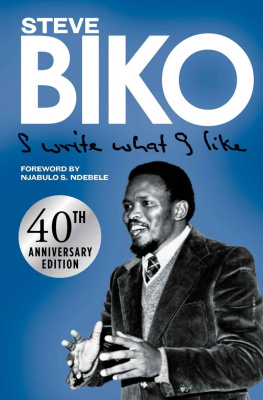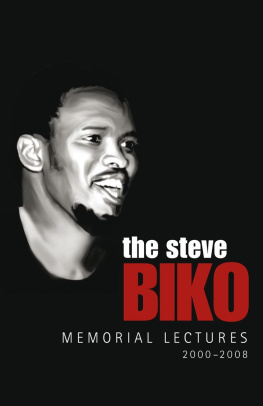Steve Biko - I Write What I Like
Here you can read online Steve Biko - I Write What I Like full text of the book (entire story) in english for free. Download pdf and epub, get meaning, cover and reviews about this ebook. year: 2017, publisher: Pan Macmillan South Africa, genre: Politics. Description of the work, (preface) as well as reviews are available. Best literature library LitArk.com created for fans of good reading and offers a wide selection of genres:
Romance novel
Science fiction
Adventure
Detective
Science
History
Home and family
Prose
Art
Politics
Computer
Non-fiction
Religion
Business
Children
Humor
Choose a favorite category and find really read worthwhile books. Enjoy immersion in the world of imagination, feel the emotions of the characters or learn something new for yourself, make an fascinating discovery.
- Book:I Write What I Like
- Author:
- Publisher:Pan Macmillan South Africa
- Genre:
- Year:2017
- Rating:4 / 5
- Favourites:Add to favourites
- Your mark:
- 80
- 1
- 2
- 3
- 4
- 5
I Write What I Like: summary, description and annotation
We offer to read an annotation, description, summary or preface (depends on what the author of the book "I Write What I Like" wrote himself). If you haven't found the necessary information about the book — write in the comments, we will try to find it.
I Write What I Like — read online for free the complete book (whole text) full work
Below is the text of the book, divided by pages. System saving the place of the last page read, allows you to conveniently read the book "I Write What I Like" online for free, without having to search again every time where you left off. Put a bookmark, and you can go to the page where you finished reading at any time.
Font size:
Interval:
Bookmark:


STEVE BIKO
A Selection of his Writings
40th Anniversary Edition
PICADOR AFRICA
First published by the Bowerdean Press (London) in 1978
First published in South Africa by Ravan Press in 1996
Published in 2004 by Picador Africa
This 40th anniversary edition published in 2017 by Picador Africa
an imprint of Pan Macmillan South Africa
Private Bag X19, Northlands, Johannesburg, 2116
www.panmacmillan.co.za
ISBN 9781770105102
eISBN 9781770105119
NM Biko 1978
Preface DM Tutu 1996
Introduction Nkosinathi Biko 2004
Foreword Njabulo S. Ndebele 2017
Mosibudi Mangena 2017
Ames Dhai 2017
Tracey Gore 2017
Silvio Humberto dos Passos Cunha 2017
All rights reserved. No part of this publication may be reproduced, stored in or introduced into a retrieval system, or transmitted, in any form, or by any means (electronic, mechanical, photocopying, recording or otherwise) without the prior written permission of the publisher. Any person who does any unauthorised act in relation to this publication may be liable to criminal prosecution and civil claims for damages.
Cover photograph courtesy of The Biko Foundation
Contents
Note on this Edition
For this 40th anniversary edition of I Write What I Like , the publisher has elected to retain all of the material in the original Picador Africa edition of the book. In addition, in the republication of this work, the integrity of the original material has been preserved. As a result, subsequent events, including changes to place names, have not been altered, and should be considered in the light of the time in which the author created this work.
Foreword
The Envisioned Self
by Njabulo S. Ndebele
The envisioned self! This expression has lain innocuously between the covers of I Write What I Like, Steve Bikos enduring book. I must have read and re-read this expression over the years. But how come I didnt see it? How come my mind didnt take in what my eyes must have seen? Or was it that my minds eye skipped over the expression each time? Can a reader read unseeingly? I think so. This realisation made sense when, on an impulse in January 2017, a few days into the writing of this foreword, I retrieved from my bookshelf a treasured gift of thirty-eight years ago.
It was the hard cover of the Bowerdean Press edition of I Write What I Like . 1978, the year of its publication, had just ended when this book, with its black and white cover, came into my life. With nostalgia stirring inside of me, I re-read Father Aelred Stubbs inscription on the title page of the book he had edited: For Njabulo and Mpho Ndebele, with gratitude & affection and in hope of better things yet to come. He dated it January 1979. I pondered his small, neat handwriting, inscribed with so light a touch as if he had not wanted to leave a mark on the page, even in the very act of inscribing word marks on it with indelible ink.
is the last chapter of I Write What I Like . In it Fr. Stubbs reflects on his enduring relationship with Steve Biko. It is the last paragraph of the memoir that is now the subject of my reflection.
The entire paragraph is a long quotation from a letter by Malusi Mpumlwana, described by Fr. Stubbs as a devoted friend of Steve. A Christmas card from Fr. Stubbs elicited effusive gratitude from Mpumlwana. When the Son of Man called himself that, during his lifetime on earth, Mpumlwana wrote, his followers never knew the meaning of the term. But now, Mpumlwana, a follower of Christ, has grasped it. The Son of Man was a prophet powerful in speech and action before God and the whole people. The power of this meaning hits home in retrospect. Significance emerges in the slow cooking of time.
It has taken me thirty-eight years to grasp a piece of Fr. Stubbs inscription better things yet to come. Suddenly, it flashed across the sky like lightning, at the end of which the expression the envisioned self revealed itself. Its full meaning, while Fr. Stubbs was still alive, had simply washed over me. Thirty-eight years later, I finally noticed and grasped it.
If Stubbs better things yet to come was like the second coming that Christians patiently wait for, Steve Bikos envisioned self was the form of its coming. What could it be in South Africa today that has crystallised the meaning of the envisioned self with such emergent clarity?
In the slow cooking of time I read yet missed the resonance of the envisioned self in my reading of the Ravan Press edition of 1996, eighteen years after the edition of my gift. I missed it yet again with the 2004 Picador edition with its phenomenal eleven reprints. For the purpose of writing this foreword, HB pencil in hand, I chose the Ravan Press edition reprint of 2000 to mark it purposefully, without Fr. Stubbs soft, hesitant markings. Perhaps it is this editions moving preface by Archbishop Desmond Tutu and insightful introduction by Malusi and Thoko Mpumlwana that predisposed me to discover the envisioned self.
Blacks are out to completely transform the system and to make of it what they wish, writes Biko. Such a major undertaking can only be realized in an atmosphere where people are convinced of the truth inherent in their stand. Liberation is of paramount importance in the concept of Black Consciousness, for we cannot be conscious of our selves and yet remain in bondage. We want to attain the envisioned self [my emphasis] which is a free self.
Every truth, it seems, has its time. Before that time arrives, the truth may be seen, perhaps even intuited, but never really grasped. The intuition of it may have a great deal to do with the circumstances in which the truth originated. If we want to attain the envisioned self which is a free self, it is because the source of that intention is the prevailing condition of un-freedom. The conditions of un-freedom and their effects on people, unless they are ended soon, are transferred from one generation to another. Each generation may find something to emphasise; and the next, something else, such that there is change and yet continuity in witness. My own journey towards an envisioned self whose significance I could not grasp fully at the time was how in the years of un-freedom, Black Consciousness reduced significantly my fear of the white oppressor. As I feared him less, the freer I felt in an un-free country. I could claim a space of personal freedom that was well beyond the oppressors reach. I think this is what thousands of students must have experienced at the University of the North (now Limpopo) on the many times that the apartheid South African Defence Force occupied their campus for a few years. The physical occupation of the campus by the army could not extend to the occupation of the students minds and hearts. These were beyond the reach of the meanest oppressor.
There can be no greater symbol of a free mind in an un-free country than that of Onkgopotse Abram Tiro, President of the Students Representative Council. On 29 April 1972, forty-five years ago, he delivered his historic graduation address. In that address he named the contradiction and hypocrisy of a campus ostensibly made for black people but run entirely by white people. The white management of the University heard him clearly and did not like his message. Tiro was to die in 1974 in Botswana when he opened a parcel bomb.
Four years after Tiros speech, the Soweto student uprising occurred on 16 June 1976. This was followed some years later by a countrywide State of Emergency declared by President P.W. Botha on 20 July 1985 which was to last for several years. The path to 27 April 1994 may not have been clearly visible, but was an imaginable reality. Up to April 1994, with the space of freedom open within themselves, the oppressed of South Africa focused on the means of removing the shackles of over one hundred years of conquest.
Font size:
Interval:
Bookmark:
Similar books «I Write What I Like»
Look at similar books to I Write What I Like. We have selected literature similar in name and meaning in the hope of providing readers with more options to find new, interesting, not yet read works.
Discussion, reviews of the book I Write What I Like and just readers' own opinions. Leave your comments, write what you think about the work, its meaning or the main characters. Specify what exactly you liked and what you didn't like, and why you think so.





